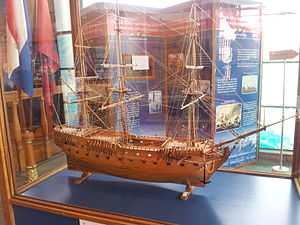Dutch ship Delft (1783)
Coordinates: 51°54′08″N 4°27′06″E / 51.90221°N 4.45154°E
 Model of the Delft at Shipyard Rotterdams Welvaren | |
| Career (Dutch Republic) | |
|---|---|
| Name: | Delft |
| Ordered: | 27 May 1782 |
| Commissioned: | 16 May 1783 |
| Out of service: | 19 January 1795 |
| Career (Batavian Republic) | |
| In service: | 19 January 1795 |
| Captured: | 11 October 1797 |
| Fate: | Sank on 15 October 1797 |
| General characteristics | |
| Class and type: | 56-gun fourth rate ship of the line |
| Propulsion: | Sails |
| Sail plan: | Full rigged ship |
The Delft was a Dutch 56-gun fourth rate ship of the line of the navy of the Dutch Republic and the Batavian Republic.
The order to construct the ship was given on 27 May 1782 by the Admiralty of the Meuse. The ship was commissioned on 16 May 1783 by the United Netherlands Navy.
On 24 December 1787 the Delft set sail on a mission against the Barbary pirates and protected Dutch traders in the Mediterranean.
For the ship's second mission starting 31 May 1793 Theodorus Frederik van Capellen became the new commanding officer. During this mission 75 Dutch slaves were freed from Algiers.
In 1795 the Dutch Republic was conquered by the French and the new Batavian Republic was founded. Delft was initially disarmed by the French (because they feared that it could be used by Orangist rebels) but the ship was later reactivated to participate in the war with Britain. Gerrit Verdooren van Asperen became her captain.
On 11 October 1797 the Delft took part in the Battle of Camperdown. Despite heavy resistance the ship was captured by the British and sank off Scheveningen four days later while being towed to Britain.
Since 2001 work had been underway in Rotterdam to build a replica of the Delft at Historical Shipyard Rotterdams Welvaren (Dutch: Historische werf Rotterdams Welvaren) in Delfshaven, near to the place where the original ship was built.
References
| Wikimedia Commons has media related to De Delft. |